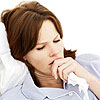Dr Joe Kosterich discusses how to know you have a flu, how flus are different from colds, and how to treat the flu.
Most people will get some form of viral illness roughly once a year, and that’s even if you’re doing all the right things to look after your health. The next question becomes, “If I do come down with the flu, what sort of things should I do?”
 There is a question before that: “How do I know if I’ve got the flu?” The main symptoms of the flu will be a fever (often 39 oC or so), for most people headache, aching around the body, a loss of energy and loss of appetite. You may not get so much the cough, runny nose and sore throat that come with cold-type illnesses. The symptoms of a flu-like illness will be different to a cold-type illness – that’s an important point, and it’s the temperature which really sets them apart. As always, if you’re not quite sure, it is worth seeing your doctor and getting checked out. Please be aware that if you do have the flu, you will not need an antibiotic, but your doctor will be able to confirm for you which form of illness you have.
There is a question before that: “How do I know if I’ve got the flu?” The main symptoms of the flu will be a fever (often 39 oC or so), for most people headache, aching around the body, a loss of energy and loss of appetite. You may not get so much the cough, runny nose and sore throat that come with cold-type illnesses. The symptoms of a flu-like illness will be different to a cold-type illness – that’s an important point, and it’s the temperature which really sets them apart. As always, if you’re not quite sure, it is worth seeing your doctor and getting checked out. Please be aware that if you do have the flu, you will not need an antibiotic, but your doctor will be able to confirm for you which form of illness you have.
So let’s assume that you do have the flu. It’s not going to be a lot of fun for a number of days, but what sort of things can you do? Resting is really important. The body does need to be able to recuperate, and will need the energies that you might normally use for your work or your sporting activities to fight off the virus. You will need to keep yourself hydrated with plenty of water to drink. Every time you have a temperature, the body will dry out a little bit, so that is really important. You probably don’t need to eat very much, and if you don’t have a lot of appetite, it won’t matter.
Now, other things. You don’t want to spread the flu around, so if you are sick, don’t go to work. It’s been estimated that presenteeism (which is people going to work when they’re sick) actually costs the economy a lot more than absenteeism (which is people having a proverbial sickie). So you don’t want to spread it around. That includes to your friends and family. Now, it doesn’t mean you have to live out the back in a cave, but you probably shouldn’t be coughing over people, you shouldn’t be sneezing over people, and even for your partner or children, if you do have a cold or flu, it’s probably not the best time to give them a wet sloppy kiss. These things sound obvious but really do make a difference.
If you need to handle food, obviously wash your hands which you should do anyway, and try not to breathe over the food. But more importantly, if it is generally your job in the household to make the dinners, it’s a really good time to pass it across to somebody else.
You don’t need to go out and buy a mask. You really just need to keep yourself broadly away from large crowds, and just take sensible precautions in your house.
Over-the-counter medications are not a cure but they may help with the symptoms, so things like paracetamol or other medications. For children, paracetamol is okay – please don’t give your children aspirin. For adults, it is okay if your stomach will tolerate it, and there is also ibuprofen that can be used. Cold and flu type remedies may help with symptoms, but they’re not a cure. If people have for example high blood pressure, they may not be suitable for use.
For the vast majority of people, the flu will last between five and seven days. You will get better, it’s not going to be the end of the world. So if you do need to rest, just accept that. Use some of the measures spoken about in this video and there will be a light at the end of the tunnel.
More information
 |
For more information on the common cold and influenza, types of influenza and treatments and tips for preventing influenza, see Cold and Flu. |
All content and media on the HealthEngine Blog is created and published online for informational purposes only. It is not intended to be a substitute for professional medical advice and should not be relied on as health or personal advice. Always seek the guidance of your doctor or other qualified health professional with any questions you may have regarding your health or a medical condition. Never disregard the advice of a medical professional, or delay in seeking it because of something you have read on this Website. If you think you may have a medical emergency, call your doctor, go to the nearest hospital emergency department, or call the emergency services immediately.







